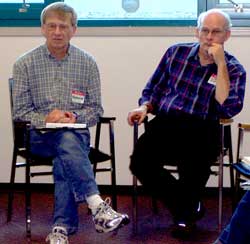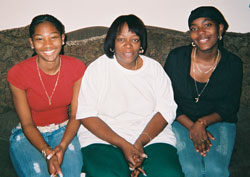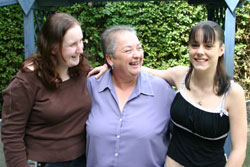News & Announcements
Paper by Wanchai Roujanavang, director general of the Department of Juvenile Observation and Protection, Thailand Ministry of Justice, presented in a plenary session at "The Next Step: Developing Restorative Communities," the IIRP''s 7th International Conference on Conferencing, Circles and other Restorative Practices, in Manchester, England, UK, November 9-11, 2005.
Paper by Graham Robb, advisor for the Behaviour and Attendance Program, Department for Education and Skills, England, presented in a plenary session at "The Next Step: Developing Restorative Communities," the IIRP''s 7th International Conference on Conferencing, Circles and other Restorative Practices, in Manchester, England, UK, November 9-11, 2005.
Paper by Belgian youth workers Elisabeth Vandenbogaerde and Michael Michiels, presented in a plenary session at "The Next Step: Developing Restorative Communities," the IIRP''s 7th International Conference on Conferencing, Circles and other Restorative Practices, in Manchester, England, UK, November 9-11, 2005.
Paper by Rev. Benjamin Shortridge, founder and executive director of Los Angeles Family and Community Empowerment Services, presented in a plenary session at "The Next Step: Developing Restorative Communities," the IIRP''s 7th International Conference on Conferencing, Circles and other Restorative Practices, in Manchester, England, UK, November 9-11, 2005.
Paper by IIRP president and founder Ted Wachtel, presented in a plenary session at "The Next Step: Developing Restorative Communities," the IIRP''s 7th International Conference on Conferencing, Circles and other Restorative Practices, in Manchester, England, UK, November 9-11, 2005.
 CoSA volunteers Bernie Martens (left) and Wayne Northey participate in a training event in Abbotsford, British Columbia, Canada.“Robert” was released from a Canadian penitentiary in 1994. He had a very long history of assaulting little boys. He was fearsome. He embodied the stereotypical image of the ham-fisted monster hiding behind telephone poles, waiting to snatch an unsuspecting child. The research tells us few such offenders lurk in our midst, but Robert (not his real name) was one of those few. The sentencing court had not declared Robert a dangerous offender. Had it done so, he would have remained in prison indefinitely. Soon, however, he was to be released, and everyone who knew him dreaded the day.
CoSA volunteers Bernie Martens (left) and Wayne Northey participate in a training event in Abbotsford, British Columbia, Canada.“Robert” was released from a Canadian penitentiary in 1994. He had a very long history of assaulting little boys. He was fearsome. He embodied the stereotypical image of the ham-fisted monster hiding behind telephone poles, waiting to snatch an unsuspecting child. The research tells us few such offenders lurk in our midst, but Robert (not his real name) was one of those few. The sentencing court had not declared Robert a dangerous offender. Had it done so, he would have remained in prison indefinitely. Soon, however, he was to be released, and everyone who knew him dreaded the day.
Harry Nigh, a Mennonite pastor in Hamilton, Ontario, a medium-sized city close to Toronto, took a call from a prison psychologist who was working with Robert leading up to his release. Robert had been to Harry’s “Welcome Inn” church in Hamilton before he was arrested and had identified Harry as a possible community support when he was released.
“It Definitely Works”John Cutro facilitated a restorative conference in the wake of a violent fight in a McDonald’s restaurant in Albany, New York. Six months later, he conducted “verification and learning” interviews with conference participants. Tracy Coleman, mother of a girl present at the fight, who attended the conference, said, “It [conferencing] definitely works. It made an abundance of difference. It [the conflict] wouldn’t have been resolved this fast.” Her daughter, Chanell, added, “I think they’d still be fighting to this day.” Regarding school mediation efforts in response to the incident, she said, “As soon as we left [mediation] we were fighting again. We didn’t get to talk about what had happened, like we did in the conference.” |
There is promise inherent in conflict. That’s the vision of John Cutro and Dennis Mosley of Albany, New York, restorative practices consultants who are combining their vision with a flexible approach to the emotionally charged process of restorative conferencing. The result is an inner city that’s getting a handle on its school and street violence, while its citizens take back the power to make proactive decisions about their quality of life.
 Missy Oliver (left) and Chanell Coleman (right) were present at the McDonald’s incident. Chanell’s mother, Tracy Coleman (center), attended the conference with her daughter.Restorative conferencing as a dispute resolution tool opens doors to real communication and understanding that remain shut in the face of more traditional methods. Conferencing works because it draws its power from within the community, instead of being imposed upon it from outside.
Missy Oliver (left) and Chanell Coleman (right) were present at the McDonald’s incident. Chanell’s mother, Tracy Coleman (center), attended the conference with her daughter.Restorative conferencing as a dispute resolution tool opens doors to real communication and understanding that remain shut in the face of more traditional methods. Conferencing works because it draws its power from within the community, instead of being imposed upon it from outside.
Cutro previously worked in the New York Capitol Defender’s Office, where he learned that the traditional justice system “is not a system, and it’s ineffective. It’s a process that produces case activities, not justice. It’s adversarial by nature, which causes polarization. Justice is the last thing you’d logically expect to come out of a process like that.”
This booklet, available at www.beyondzerotolerance.org, was issued as part of a campaign by the California (USA) Statewide Task Force for Effective Drug Education. It advocates restorative practices, as implemented by the IIRP''s SaferSanerSchools program, as a critical piece in its approach to drug education.
The Crime and Justice Research Centre, Victoria University, Wellington, New Zealand, and the New Zealand Ministry of Justice have released a research evaluation of restorative conferences for juvenile and adult offenders that contains highly positive results. Two-hundred six court-referred conferences, all of which included victim participation (or representation), were evaluated over a one-year period.
From Sanctions to Support: Restorative Practices Transform Homes for Looked-after Children in the UK
 Veronica Hart and two Stanfield Home residents
Veronica Hart and two Stanfield Home residents
About four years ago, the Stanfield Home for looked-after children, in Welwyn-Garden City, Hertfordshire, UK, was in crisis. Relationships between staff and children were terrible, and there were many violent incidents, said Stanfield manager Veronica (Ron) Hart. Staff stress was causing big turnover rates and lots of long-term sick leave. Then restorative practices turned things around.
Stanfield consists of two homes, housing six youths each, on one site—one for ages 11-15 and one for ages 13-18 and older. These are youth who can’t live with their family or a substitute (foster) family, due to abuse or neglect, or those with educational, truancy or behavioral problems, placed in the home by county social services.
